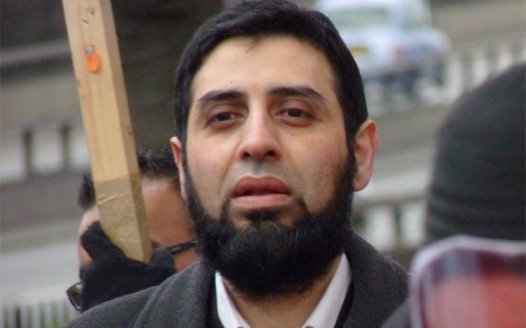Stop reflexively saying yes to religious groups
Posted: Fri, 21st Sep 2018 by Chris Sloggett
As councils in north London, police in West Yorkshire and politicians in Westminster pander to religious groups' demands, Chris Sloggett says public bodies should stop taking the line of least resistance.
When you're up against someone who wants something, is there an easier word to say in the English language than 'yes'? You're a tired parent dealing with a persistent child – just say yes. You're an overworked doctor facing a patient who wants antibiotics – just say yes. And if you're a public body confronted with an offended or demanding religious group?
In recent days a series of them have just said yes. Earlier this week came the revelation that Camden Council in north London is to spend £80,000 on an out-of-hours coroners' service. The service isn't explicitly for religious groups alone – the council still has to adhere to a relatively secular interpretation of its responsibilities – but it's clear why it's been set up. Assertive Jewish and Muslim 'representatives' in the area have called for special treatment and mustn't be offended.
The good news is that this brings relief for Mary Hassell, who has bravely stood up for the collective interests of the residents of inner north London in recent months in the face of sustained religious bullying. At least in the short-term, she and her colleagues will be able to run a better service for the religious groups who have relentlessly attacked her for trying to manage her priorities.
If that were the end of it, saying yes would be fine. Unfortunately it isn't the end of it. But nobody seems to want to ask what this means in the grand scheme of things.
What does this spending mean for other budgets in the borough? Where has this money come from? Who's missing out or having their service cut back as a result? How much more is the council prepared to spend when it faces more pressing, urgent and widespread demands from groups representing sectional interests?
But asking such questions might lead the council to say no. Saying no would bring the wrath of religious groups. Just say yes.
Camden's decision follows a similar one in a neighbouring area. Three weeks ago the NSS revealed that five other councils in north London would spend £56,000 on a similar service. Haringey Council said the money would fund a "formal out-of-hours coroners' service for faith communities". It explicitly cited the large Jewish and Muslim populations in the area. It didn't give a justification for the service which didn't relate to their wishes (or the legal action that had resulted from their wishes).
The council has committed public funds to a service which ignores the interests of most of the people paying for it. It's encouraged religious leaders to make other demands on public services. It's encouraged people to dilute their attachment to the common good. And it risks causing resentment among those who pay for a service they find unnecessary.
It is possible both to understand the Jewish and Muslim tradition for burying the dead quickly (or even to admire it) and advocate a public policy which politely asks people to wait their turn. If we can take individualistic demands off the coroners' hands and spend public money on decent services for everyone, anyone whose relative goes to the coroner will be able to bury their dead as soon as possible. They'll be able to use whatever rituals they see fit. And they'll have a stronger public service which helps to protect the living.
But that doesn't fit easily into a newspaper headline or generate generous platitudes from powerful religious leaders. Just say yes.
This week West Yorkshire Police also said yes. The force has introduced a new 'uniform' which, in the words of its assistant chief constable Angela Williams, "is designed not to show the female form".
The force says the decision is part of an effort to encourage more Muslim women to join up. Senior officers have met with a group called the Muslim Women's Council in Bradford. Williams, with more than a hint of hyperbole, has said "We are absolutely all over this".
Helping those from disadvantaged backgrounds to enjoy more opportunities may be a noble goal. But if you'll pardon the pun, you can dress this one up however you like. The state has endorsed an Islamic modesty code. The current uniforms that police officers wear are hardly phwoar-lads-top-shelf-of-the-supermarket stuff. If some women from Muslim backgrounds find them off-putting, perhaps it isn't the uniform which needs to change.
Someone should also have asked whether the state should encourage its employees to notice their personal differences in the workplace. Wearing a uniform is a reminder that police officers are on duty and have given themselves over to the service of the public during working hours. It's a reminder that they represent us all, not an exclusive group of us, and they make an effort to meet society's expectations of their position. It's a reminder that any differences between them at work are based on professional rank – not social status, ethnic origin, class, choice of football team or personal belief.
Surely the whole point of having a uniform is to ensure everybody wears the same thing? Doesn't introducing an alternative 'uniform' open the door for anyone else to demand opt-outs? Do we allow police officers to turn up to work, for example, wearing trainers? If not, why not? Doesn't this decision undermine the values that the uniform embodies?
Isn't West Yorkshire Police patronising Muslim women by assuming they can't wear the same clothes as everyone else? What else does the force think Muslim women can't do? What is it saying to Muslim or ex-Muslim women who just want to keep their faith or lack of it private? What is it saying to Muslims or ex-Muslims who want to be treated the same as anyone else? And shouldn't we be encouraging those Muslims who don't see themselves that way to change their mindset?
But asking such questions might have led West Yorkshire Police to say no. Saying no would have meant missing out on easy photo opportunities. Maybe there would have been negative press coverage. Just say yes.
Let's return to north London. Last week Brent Council said yes to a Hindu group. The council had committed the apparently cardinal sin of putting an advert for the area which included a picture of a temple on the outside of a public toilet. The Hindu Council UK, along with a councillor in a different London borough who seems to have far too much time on her hands, complained. Within a day the posters had been taken down and Brent had issued a grovelling apology on Twitter.
Saying yes is easy. All you have to do is ask a contractor to take the poster down.
But why is Brent Council wasting its time and resources pandering to this outraged group? Is it willing to invite and entertain other pathetic objections to the adverts that appear in the borough? Will it now waste more time – and wasting councils' time means wasting public money – considering whether supposedly grown adults might take offence at its potential poster placement before putting them up? What other demands is it now prepared to give in to? Will it take responsibility for the precedent it's set for other councils?
Asking those questions might have led Brent Council to say no. Saying no might have brought negative headlines and confected outrage. Just say yes.
The British state has been uncritically saying yes to religious groups for as long as it's existed. Usually this has meant saying yes to the churches – hence the continuing establishment of the Church of England.
In the 21st century we've increasingly convinced ourselves that all we need to do to organise society fairly is say yes to more groups. We can have our cake and eat it. We can be multifaithists.
We can have faith schools catering to parents from all kinds of religious backgrounds. We can let religious groups tell us we can't mock their beliefs or use flags which include 'their' symbols in pubs. We can let religious groups not just contribute to but dictate the terms on which bigotry against them will be defined in polite society.
And perhaps next, if the 'faith minister' gets his way, we can let more religious leaders sit in the House of Lords. Not content with the fact 26 bishops already wander on to the red benches to decide what laws us lesser beings must follow the moment they gain a particular rank in the Church of England, Lord Bourne said last week leaders of non-Christian religions should be given places in the upper house.
This would entrench the deference we already show to religion. It would give an ever-increasing number of religious groups greater capacity to demand special treatment. But it's easier to say yes to the imams and rabbis than it is to say no to the bishops.
We need to hold the authorities to account for reflexively doing what the religious groups tell them. When they are asked to make accommodations we should ask them if they have honestly concluded that the benefit to society – both measurable and not, long-term as well as short – outweighs the harm. If so, fine. Reasonable people may think the authorities' decisions in some of the examples I've outlined above can be justified. There's room for debate. But at least have the debate. A situation where religious groups say "jump" and the state replies "how high?" is not sustainable.
Councils, the police and others in the public sector need to be told that sometimes saying yes means spending public money unjustifiably, undermining common citizenship, patronising grown adults and encouraging selfish, aggressive, separatist demands. We should tell them that sometimes a cohesive society relies on them saying no.
We should tell them they should stop treating the most assertive religious voices as if they speak for whole groups of people. They should stop seeing religious demands as a chance to win or lose a headline in tomorrow's newspaper. They should start asking questions. They should stop just saying yes.
While you're here
Our news and opinion content is an important part of our campaigns work. Many articles involve a lot of research by our campaigns team. If you value this output, please consider supporting us today.








